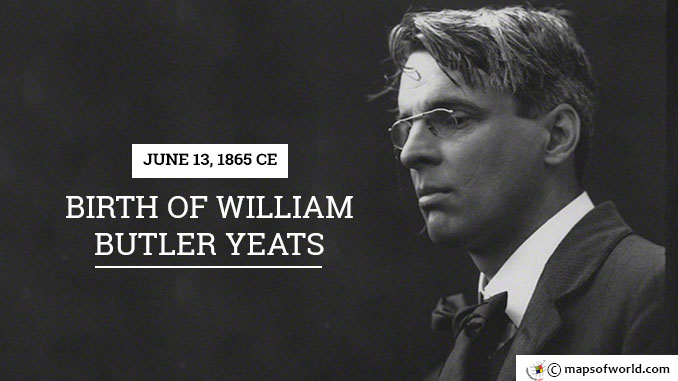In a small coastal town to the southeast of Dublin, the famed Irish poet and nationalist William Butler Yeats was born on June 13th, 1865 to John Butler Yeats and Mary Pollexfen. Within a few months of his birth, the family moved nearer to his mother’s parents in Sligo on the opposite side of the country. Growing up amongst its lush green hillsides, he would remember the area fondly for the rest of his life, often visiting during the summer months to relax and recuperate. After bouncing back and forth between London and Dublin, the Yeats family settled in the English capital in 1887. Growing in reputation as both a poet and playwright, he and friend Ernest Rhys founded the Rhymers Club – a social group discussing the nuts and bolts of poetry while sharing their current work – while publishing three books on Irish literature. Though thrilled with the intellectual engagement, Yeats still found his heart drawn to the Emerald Isle. Near the turn of the 20th century, Yeats took a principal role in The Irish Literary Theatre, working as the primary writer for the company’s productions while splitting time between London and Dublin. Over a little more than a decade, he created three of his best-known works, The Countess Cathleen (1892), The Land of Heart’s Desire (1894) and The King’s Threshold (1904). His fame now assured, Yeats took the now-Abbey Theatre on its first tour of the United States – he joined the company and presented lectures at prominent literary clubs, as well. When it came to relationships, the handsome Irishman found himself more comfortable with the friendship of women as opposed to romance. Some might argue the sting of being spurned by Maud Gonne, an actress he worked with at the theater, created within him a bitterness that forced him to shield his heart from another. He proposed to her on four separate occasions, three before her marriage to another man and then the last after he gleefully witnessed their divorce proceedings almost a decade later. In 1911, he met an attractive young woman named Georgie Hyde-Lees and began courting her almost immediately. Despite the protests of her friends about Yeats’ age (27 years her senior) and his singular desire to conceive children instead as opposed to being a dutiful husband with a family, the two were married in October 1917. The two had common interests in mysticism – which informed much of the symbolism in his poetry – and would give birth to a daughter, Anne, and son, Michael, in the coming years. Ever the political activist, Yeats commemorated the Easter Uprising of 1916 – an event many of his friends joined in – with a poem the following September. He soon purchased a summer home in Galway, moving his family back and forth throughout the year between there and Dublin. As the Irish Civil War broke out in 1922, Yeats found himself with a seat in the Irish Senate, arguing with other well-respected Irishmen about the virtues of an independent Ireland. The following year, as he claimed the Nobel Prize in Literature for his work as both poet and playwright with the Abbey Theatre, he saw it as a victory for his nation as a whole, going so far as to claim in his acceptance speech “it is part of Europe’s welcome to the Free State.” His health failing, Yeats stepped away from life as a politician in 1928, after his second term. When he regained quite a bit of strength due to an operation in 1934 – such that he was implicated in affairs with a number of women – his writing continued at an admirable pace for a man in his seventies, as he assumed the role of editor for the Oxford Book of Modern Verse in 1936. Early in 1939, at the age of 73, Yeats succumbed to the ravages of time in the small town of Menton, on the southern coast of France. According to his wishes, Georgie buried him in the hills above town with little fanfare. But, he asked, “in a year’s time when the newspapers have forgotten me, dig me up and plant me in Sligo.” Irish to the core, Yeats’ remains came to their final resting place in Drumcliffe, County Sligo, in 1948.
June 13, 1865 CE – Birth of William Butler Yeats
In a small coastal town to the southeast of Dublin, the famed Irish poet and nationalist William Butler Yeats was born on June 13th, 1865 to John Butler Yeats and…
367
